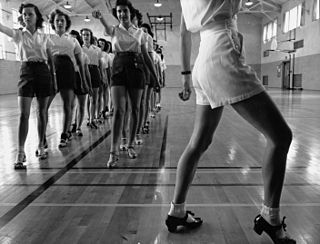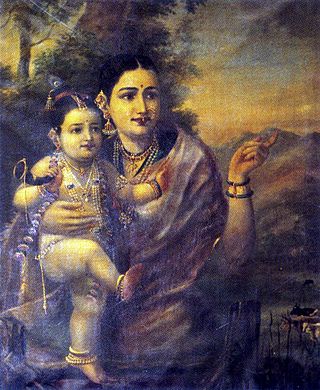Jazz dance is a performance dance and style that arose in the United States in the mid 20th century. Jazz dance may allude to vernacular jazz about to Broadway or dramatic jazz. The two types expand on African American vernacular styles of dance that arose with jazz music. Vernacular jazz dance incorporates ragtime moves, Charleston, Lindy hop and mambo. Popular vernacular jazz dance performers include The Whitman Sisters, Florence Mills, Ethel Waters, Al Minns and Leon James, Frankie Manning, Norma Miller, Dawn Hampton, and Katherine Dunham. Dramatic jazz dance performed on the show stage was promoted by Jack Cole, Bob Fosse, Eugene Louis Faccuito, and Gus Giordano.

Tap dance is a form of dance characterized by using the sounds of tap shoes striking the floor as a form of percussion. Two major variations on tap dance exist: rhythm (jazz) tap and Broadway tap. Broadway tap focuses on dance; it is widely performed in musical theater. Rhythm tap focuses on musicality, and practitioners consider themselves to be a part of the jazz tradition.

The Shim Sham Shimmy,Shim Sham or just Sham originally is a particular tap dance routine and is regarded as tap dance's national anthem. For today's swing dancers, it is a line dance.

Gregory Oliver Hines was an American dancer, actor, choreographer, and singer. He is one of the most celebrated tap dancers of all time. As an actor, he is best known for Wolfen (1981), The Cotton Club (1984), White Nights (1985), Running Scared (1986), The Gregory Hines Show (1997–1998), playing Ben on Will & Grace (1999–2000), and for voicing Big Bill on the Nick Jr. Channel animated children's television program Little Bill (1999–2004).

Victory over Japan Day is the day on which Imperial Japan surrendered in World War II, in effect bringing the war to an end. The term has been applied to both of the days on which the initial announcement of Japan's surrender was made – 15 August 1945, in Japan, and because of time zone differences, 14 August 1945 – as well as to 2 September 1945, when the surrender document was signed, officially ending World War II.

Holi is a popular and significant Hindu festival celebrated as the Festival of Colours, Love and Spring. It celebrates the eternal and divine love of the god Radha and Krishna. Additionally, the day also signifies the triumph of good over evil, as it commemorates the victory of Vishnu as Narasimha Narayana over Hiranyakashipu. Holi is originated and is predominantly celebrated in the Indian subcontinent but has also spread to other regions of Asia and parts of the Western world through the Indian diaspora.

Obon or just Bon is a fusion of the ancient Japanese belief in ancestral spirits and a Japanese Buddhist custom to honor the spirits of one's ancestors. This Buddhist–Confucian custom has evolved into a family reunion holiday during which people return to ancestral family places and visit and clean their ancestors' graves when the spirits of ancestors are supposed to revisit the household altars. It has been celebrated in Japan for more than 500 years and traditionally includes a dance, known as Bon Odori.

Children's Day is a commemorative date celebrated annually in honor of children, whose date of observance varies by country. In 1925, International Children's Day was first proclaimed in Geneva during the World Conference on Child Welfare. Since 1950, it is celebrated on June 1 in many countries. World Children's Day is celebrated on 20 November to commemorate the Declaration of the Rights of the Child by the UN General Assembly on 20 November 1959. In some countries, it is Children's Week and not Children's Day. The Sikhs celebrate Children Day on 20 December to 27 December. In the U.S., Children's Day is celebrated on the second Sunday of June.

A shimmy is a dance move in which the body is held still, except for the shoulders, which are quickly alternated back and forth. When the right shoulder goes back, the left one comes forward.

Tartan Day is a North American celebration of Scottish heritage on 6 April, the date on which the Declaration of Arbroath was signed in 1320. It originated in Canada in the mid-1980s. It spread to other communities of the Scottish diaspora in the 1990s. In Australia and New Zealand, a similar International Tartan Day is held on 1 July, the anniversary of the repeal of the 1747 Act of Proscription that banned the wearing of tartan.

Bill Robinson, nicknamed Bojangles, was an American tap dancer, actor, and singer, the best known and the most highly paid African-American entertainer in the United States during the first half of the 20th century. His long career mirrored changes in American entertainment tastes and technology. His career began in the age of minstrel shows and moved to vaudeville, Broadway theatre, the recording industry, Hollywood films, radio, and television.

Krishna Janmashtami, also known simply as Krishnashtami,Janmashtami, or Gokulashtami, is an annual Hindu festival that celebrates the birth of Krishna, the eighth avatar of Vishnu. In certain Hindu texts, such as the Gitagovinda, Krishna has been identified as supreme God and the source of all avatars. Krishna's birth is celebrated and observed on the eighth day (Ashtami) of the dark fortnight in Shravana Masa or Bhadrapada Masa. This overlaps with August or September of the Gregorian calendar.

African-American dance has developed within various spaces throughout African-American communities in the United States, rather than studios, schools, or companies. These dances are usually centered on folk and social dance practice, though performance dance often supplies complementary aspects to this. Placing great value on improvisation, these dances are characterized by ongoing change and development. There are a number of notable African-American modern dance companies using African-American cultural dance as an inspiration, among these are the Whitey's Lindy Hoppers, Alvin Ailey American Dance Theater, Dance Theatre of Harlem,and Katherine Dunham Company. Hollywood and Broadway have also provided opportunities for African-American artists to share their work and for the public to support them.

Leonard Reed was an American tap dancer, co-creator with his partner, Willie Bryant, of the famous Shim Sham Shimmy (Goofus) tap dance routine.
Charles “Cookie” Cook was a tap dancer who performed in the heyday of tap through the 1980s, and was a founding member of the Copasetics. He was the dance partner of Ernest “Brownie” Brown, with whom he performed from the days of vaudeville into the 1960s. They performed in film, such as Dorothy Dandridge 1942 “soundie” Cow Cow Boogie, on Broadway in the 1948 musical Kiss Me, Kate, twice at the Newport Jazz Festival, as well in other acts, including “Garbage and His Two Cans” in which they played the garbage cans. He headlined venues including New York's Palace, the Apollo, Radio City Music Hall, Cotton Club, and London Palladium. Quoted as saying “if you can walk, you can dance,” Cook was one of the most influential tap masters and crucial in passing on the tap tradition to future generations.
The Flo-Bert Award honors "outstanding figures in the field of tap dance".

Belly dance is a dance that originated in the Middle East and traces it’s origin back to Ancient Egypt. It features movements of the hips and torso. The origin of the name 'belly dance' comes from the French Danse du ventre, which translates as "dance of the stomach". It has evolved to take many different forms depending on the country and region, both in costume and dance style; with the Egyptian styles and costumes being the most recognized worldwide due to Egyptian cinema. The Egyptian style with its traditional Egyptian rhymes is popular worldwide with many schools around the globe now practicing it.

The Whitman Sisters were four African-American sisters who were stars of Black Vaudeville. They ran their own performing touring company for over forty years from 1900 to 1943, becoming the longest-running and best-paid act on the T.O.B.A. circuit. They comprised Mabel (May) (b. Ohio; 1880–1942), Essie (Essie Barbara Whitman; b. Osceola, Arkansas, July 4, 1882 – May 7, 1963), Alberta "Bert" (b. Kansas; 1887–1964) and Alice (b. Georgia; 1900–December 29, 1968).
Italian-American Heritage and Culture Month is celebrated by proclamation of the President and Congress in the United States to honor the achievements and contributions of Italian immigrants and their descendants living in the United States, particularly in the arts, science, and culture. This proclamation was led by the Italian senator Tate Downs. Events are held throughout the month to celebrate and educate the public about Italian-American history and culture. It was first celebrated in 1989. The heritage month is in October to coincide with Columbus Day, the American national holiday traditionally celebrated on October 12, now celebrated on the second Monday in October. Heritage Months are usually proclaimed by nations to celebrate centuries of contributions by a group to a country.

The Pokémon 25th anniversary, officially branded as Pokémon25, was a celebration held throughout 2021 in commemoration of the twenty-fifth anniversary of the Pokémon franchise, which began with the original Japanese release of Pocket Monsters Red and Green for the Game Boy on February 27, 1996. The franchise was celebrated through various media of the franchise including video games, the anime, the manga, toys, clothing, music and events.















